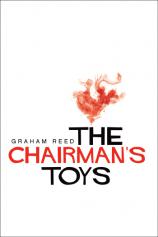Author Talk: July 10, 2018
Graham Reed’s debut novel, THE CHAIRMAN’S TOYS, introduces readers to Jake Constable, an ex-drug dealer who is determined to turn his life around --- but the discovery of a dead body may put those plans on hold. In this interview, Reed talks about the authors to whom he turned for inspiration as he prepared to write his first mystery and the “research” he conducted for it; his fascination with crime fiction, which started at an early age (before he learned to drive); and the important lesson he learned about the writing process that he is applying to the second book in the series, which is currently in the works.
Question: You didn't have as many examples of Canadian crime fiction authors to inspire you as your American brethren. Even so, to which Canadian writers did you turn for inspiration as you prepared to write this first novel?
Graham Reed: This may get my government-issued maple leaf revoked, but the truth is most of my inspiration came from writers such as Carl Hiaasen, Kinky Friedman and Elmore Leonard the first time around. Happily, though, as a resultof writing THE CHAIRMAN’S TOYS, I have come to know some excellent Canadian crime writers, including Sam Wiebe, Charlie Demers and Sheena Kamal --- all of whom are tremendous sources of inspiration as I work on book two.
Q: Having chosen Vancouver as the setting for THE CHAIRMAN’S TOYS, did you have to conduct any specific research to provide the details within the book?
GR: For my first book, the story wended through areas of the city that I know very well. This occurred naturally, rather than by any conscious decision. As a result, I didn't need to do much in the way of specific research beyond getting away from my desk to spend more time in the neighbourhoods and venues featured in the book (which fortunately included a couple of my favourite bars and coffee shops). In book two, Jake Constable ventures a little further afield and gets tangled up in some activities that I wasn't overly familiar with, so I haven't been able to pass off an evening in the pub as research this time around.
Q: How old were you when crime fiction first captured your attention? Did you have a few favorite authors during your formative years?
GR: I turned to a life of crime-fiction-reading before I learned to drive, which was probably for the best since Lawrence Block's novels had me aspiring to be a burglar (and/or a bookseller). Lacking a proper set of lock picks, I instead tried my hand at breaking into a few cars --- possible because I was also a huge fan of Donald Westlake's Dortmunder books (which usually featured some great getaway-car scenes). Since I hadn't learned to drive, hot wiring and absconding never crossed my adolescent mind. In my defence, I always used finesse (in the form of a coat hanger) rather than force, and did it (almost) exclusively for altruistic, or at least benign, motivations: liberating keys from a locked car, or simply popping the locks on my dad's Dodge Polara for fun.
Q: Along the way to being published, THE CHAIRMAN’S TOYS earned some promising attention. Tell us how that impacted the book ultimately landing at Poisoned Pen Press.
GR: My manuscript caught the attention of Annette Rogers, my fantastic editor at Poisoned Pen Press, when it won the Freddie Award for Writing Excellence from the Mystery Writers of America at Florida's Sleuthfest. For any aspiring writers out there, I highly recommend submitting your work to such competitions. It can be a great way to make contact with crime fiction publishers, and the (experienced and knowledgeable) judges provide very helpful feedback on your work.
Q: With your first novel now under your belt, what did you learn from writing it that will change your approach for book two?
GR: Don't edit as I go! For me, it turns the text into quicksand. I wrote THE CHAIRMAN’S TOYS shortly after the birth of our second child, which meant that a regular writing schedule wasn't an option. Days would slip by without me working on the book. To refresh my memory and get back into it, I would reread, and inevitably edit (and re-edit), the last chapter I had written. Totally inefficient. (At least for me. I have read that Kurt Vonnegut wrote and edited as he went, refusing to move on until he was totally happy with each page. Clearly it worked for him!)
I am currently working on the second book in the series, and life has normalized (at least to the extent it ever will with two young kids calling the shots). This time around, I have been able to maintain a very regular daily writing schedule. It keeps me immersed in the story, which enables me to better maintain my writing momentum. I'm finding it to be a much more effective and enjoyable approach.




